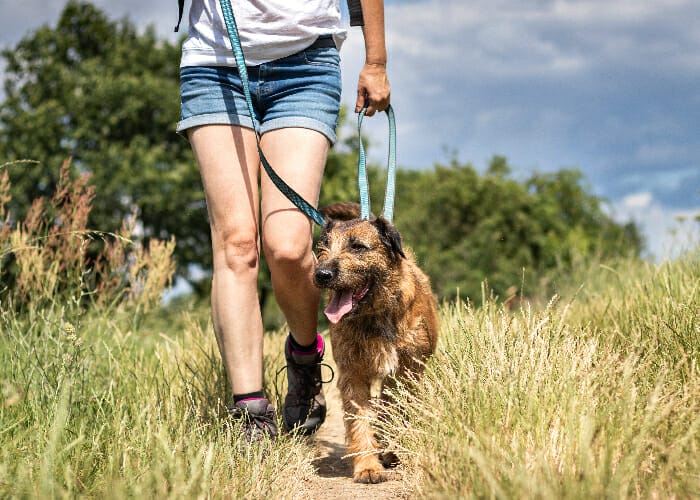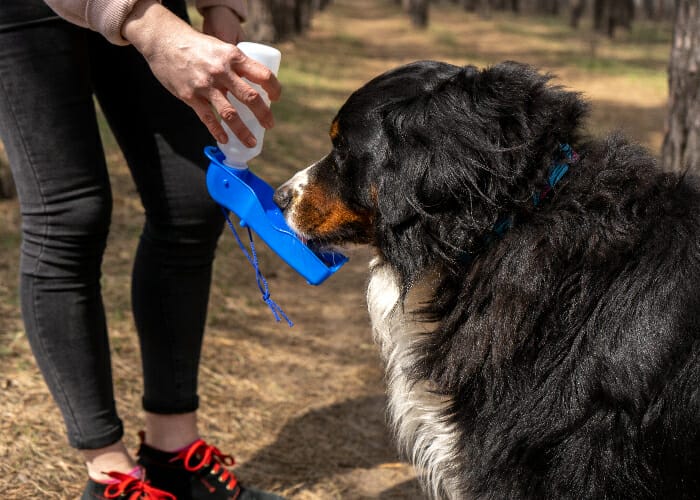Emergency Medicine, Urgent Care
10 Useful Tips for Hiking and Camping with Your Pets

Camping can be a fun activity for families and their beloved pets. Many dogs, and some cats, enjoy traveling and exploring the outdoors with their families, especially in the summer months. If you will be enjoying outdoor adventures with your pets, keep these 10 tips in mind.
1) Know Before You Go
Before you depart, research the campground or area that you will be visiting. Not all accept pets, and many have leash laws for dogs. Knowing about any restrictions ahead of time gives you the chance to choose a different location, guide your pack list, or make arrangements for boarding or a pet sitter.
2) Check Your Pet’s Vaccination Records
Your pet’s vaccines protect them from diseases, so make sure they’re up to date. Current rabies vaccines are a legal requirement for your pet’s safety and yours. Check with your family veterinarian for any other vaccines that may be recommended based on the area that you’re visiting. For example, Leptospirosis (a bacterial disease spread through the urine of infected animals) and Lyme (a tick-borne illness) vaccines are not given routinely by all veterinarians to dogs, although protection for these diseases may be a good idea when visiting certain areas such as forests or campgrounds. Campgrounds may also require proof of vaccinations.
3) Bring Medicines, Medical Records, and Proof of Vaccinations
Is your pet taking any medications? Be sure to bring enough for your trip plus a few days extra in case some become damaged or lost. If your pet has any chronic medical conditions, bring copies of their medical records, too. This information will help the treating veterinarian make quicker and more appropriate decisions about your pet’s care should they experience a medical emergency.
4) Follow Your Pet’s Mealtime Routine
Changes in your pet’s diet can cause gastrointestinal issues so it’s best to feed them the food they’re accustomed to. If your pet does experience GI issues while traveling, you’ll also know it’s not from their diet. Bring enough food and water for your entire trip along with their bowls.
5) Watch What Your Pet Drinks
River, lake, and standing water may not be safe for your pet to drink. There are certain intestinal parasites, like giardia (an intestinal infection caused by a parasite) and cryptosporidium (a microscopic parasite that causes a diarrheal disease), that your pet can get from drinking water in the wilderness.

6) Keep Your Pet Protected from Fleas and Ticks
Make sure to use year-round flea and tick control on your pets. There are diseases carried by these blood-sucking parasites and your pet may encounter more of them out in the great outdoors.
7) Pack Your Pet’s First-Aid Kit
Just as humans need first-aid kits, so do pets! Your pet’s first-aid kit should include betadine solution to clean and disinfect wounds, hydrogen peroxide, topical antibiotic ointment, basic bandaging materials like gauze squares, medical tape, gauze rolls, and sterile eye wash.
8) Bring Your Cat’s Litter Box and Extra Litter
Though not as common as dogs, cats also join their families camping. Remember to bring your cat’s litter box and their favorite type of litter to maintain their preferences.
9) Keep Your Pet Under Control
Keep your dog on a leash to minimize their encounter with unpleasant wildlife and to avoid disturbing other campers. Your cat should ride in a carrier when traveling and have a leash on while outside. A frightened cat would be difficult, if not impossible, to catch in the wilderness.
10) Enjoy the Adventure!
Enjoy quality time in nature with your pet and family – don’t forget to take some photos!
With these simple precautions, your pets can enjoy the outdoors along with you!
Read more about how to make a first aid kit for your pet and additional tips to keep your pet safe all year round.